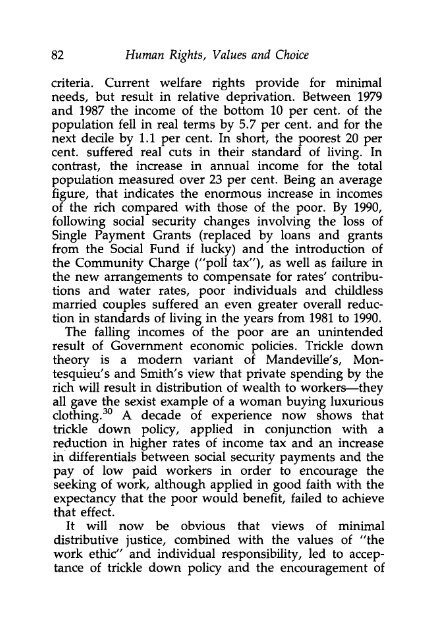The United Kingdom and Human Rights - College of Social ...
The United Kingdom and Human Rights - College of Social ...
The United Kingdom and Human Rights - College of Social ...
Create successful ePaper yourself
Turn your PDF publications into a flip-book with our unique Google optimized e-Paper software.
82 <strong>Human</strong> <strong>Rights</strong>, Values <strong>and</strong> Choice<br />
criteria. Current welfare rights provide for minimal<br />
needs, but result in relative deprivation. Between 1979<br />
<strong>and</strong> 1987 the income <strong>of</strong> the bottom 10 per cent, <strong>of</strong> the<br />
population fell in real terms by 5.7 per cent, <strong>and</strong> for the<br />
next decile by 1.1 per cent. In short, the poorest 20 per<br />
cent, suffered real cuts in their st<strong>and</strong>ard <strong>of</strong> living. In<br />
contrast, the increase in annual income for the total<br />
population measured over 23 per cent. Being an average<br />
figure, that indicates the enormous increase in incomes<br />
<strong>of</strong> the rich compared with those <strong>of</strong> the poor. By 1990,<br />
following social security changes involving the loss <strong>of</strong><br />
Single Payment Grants (replaced by loans <strong>and</strong> grants<br />
from the <strong>Social</strong> Fund if lucky) <strong>and</strong> the introduction <strong>of</strong><br />
the Community Charge ("poll tax"), as well as failure in<br />
the new arrangements to compensate for rates' contributions<br />
<strong>and</strong> water rates, poor individuals <strong>and</strong> childless<br />
married couples suffered an even greater overall reduction<br />
in st<strong>and</strong>ards <strong>of</strong> living in the years from 1981 to 1990.<br />
<strong>The</strong> falling incomes <strong>of</strong> the poor are an unintended<br />
result <strong>of</strong> Government economic policies. Trickle down<br />
theory is a modern variant <strong>of</strong> M<strong>and</strong>eville's, Montesquieu's<br />
<strong>and</strong> Smith's view that private spending by the<br />
rich will result in distribution <strong>of</strong> wealth to workers—they<br />
all gave the sexist example <strong>of</strong> a woman buying luxurious<br />
clothing. 30 A decade <strong>of</strong> experience now shows that<br />
trickle down policy, applied in conjunction with a<br />
reduction in higher rates <strong>of</strong> income tax <strong>and</strong> an increase<br />
in differentials between social security payments <strong>and</strong> the<br />
pay <strong>of</strong> low paid workers in order to encourage the<br />
seeking <strong>of</strong> work, although applied in good faith with the<br />
expectancy that the poor would benefit, failed to achieve<br />
that effect.<br />
It will now be obvious that views <strong>of</strong> minimal<br />
distributive justice, combined with the values <strong>of</strong> "the<br />
work ethic" <strong>and</strong> individual responsibility, led to acceptance<br />
<strong>of</strong> trickle down policy <strong>and</strong> the encouragement <strong>of</strong>

















